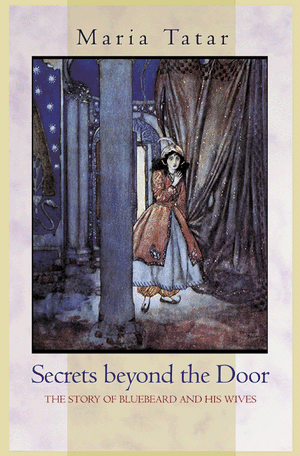Maria Tatar shares her valuable insights in her book Secrets beyond the Door: The Story of Bluebeard and His Wives. First of all, "Bluebeard" is not the only fairy tale to have been granted a moral that seems a bit irrelevant to the text. His moral for "Donkeyskin" ends with: "Finally, we must take into account that clear water and brown bread are sufficient nourishment for all young women provided that they have good habits, and that there is not a damsel under the skies who does not imagine herself beautiful."* (Note: this is from the Tatar text. In my Jack Zipes translation of Perrault's "Donkeyskin" the moral is completely different).
By not mentioning the issue of incest, or the daughter's courageous journey, Tatar sees Perrault as dismantling "the notion that the story has any message at all by engaging in self-parody through the proliferation of irrelevant messages." So is Perrault's whole message that it is foolish to try and look for a moral in fairy tales? Ironically, modern fairy tale scholars would agree with him as well, though for years adults sought desperately to try to find morals to make the tales suitable for children.
These morals sometimes become ridiculous when they contradict what actually happens in the story. For all the blame editors and publishers heaped on Bluebeard's wife throughout the years, she always ends up the winner in the end, and Bluebeard's death is justified. If there were no curiosity and no murders, there would be no story.
Harry Clarke
Also, Perrault has a second moral. Tatar says that the reader would expect it to be the counterpart to the condemnation of the wife, and condemn the husband. But the moral does exactly the opposite-it claims that "no longer are husbands so terrible, or insist on having the impossible...He tries to do as he's obliged. And whatever color his beard may be, it's difficult to know who the master be."
So in one moral, Perrault endorses limiting women's power, and the other claims that women are so powerful they have mastery over their husbands. Tatar says these two morals are mutually exclusive, "so symptomatic of how fairy tales send mixed messages that Perrault, perhaps unwittingly, crafted what appear to be two very different readings of his own story." But if you buy into the premise that powerful women are dangerous and dangerous men simply don't exist, it seems logical that Perrault could be warning against women gaining power-I don't see the two morals being mutually exclusive, but being on the surface incredibly and shockingly sexist.
Tatar points out that the color blue had come to represent royalty in France, so the fairy tale could be read as a tale of class tyranny. Interestingly, during his lifetime Perrault switched from opposing King Louis XIV to supporting him.
Perrault was a feminist, for his time. He was active in the literary salons of the popular female fairy tale writers of his time, Mlle. L'Heritier (his neice) and Mme. d'Aulnoy, among others. His works, according to Jack Zipes (in Beauties, Beasts, and Enchantments), "stress the necessity of an enlightened attitude of fairness toward women, but fairness on male terms." Zipes also reminds us that Perrault's tales were intended for adults, who would "understand his humor and the subtle manner in which he transformed folklore superstition to convey his position about the 'modern' development of French civility." So it would be more likely that he didn't mean for his morals to be taken at face value.
So I guess this is an example of the baby steps towards feminism, although it seems pretty unlikely to the modern reader.



This doesn't work toward shedding light on the question at hand, the more I read and think about morals at the end of fairy tales, the more I feel that the voice, narrator, or author is secondary to the images and actions in the tale. Whatever the intention of the voice-narrator-author, the tale itself surmounts it, giving it cultural longevity--not the moral.
ReplyDeleteOr maybe that's a subconscious way to excuse myself for not understanding it!
You're absolutely right-the stories themselves have lasted for generations, whereas we can get totally different (even opposite) meanings from them when reading them today. Which is a big part of the reason fairy tales do remain with us for so long-they're malleable enough to be adapted to pretty much any culture
ReplyDelete